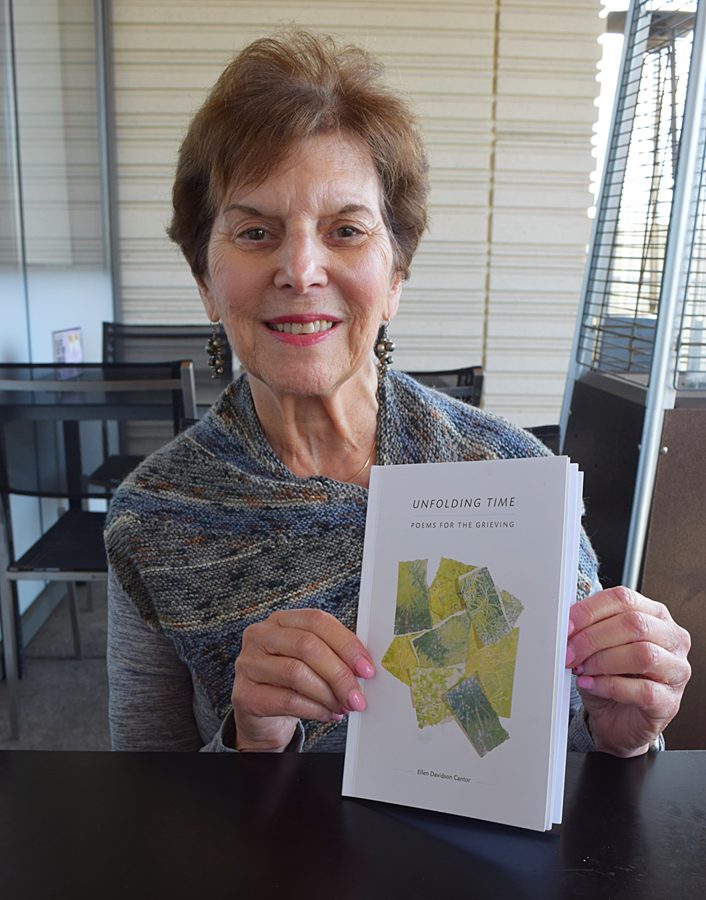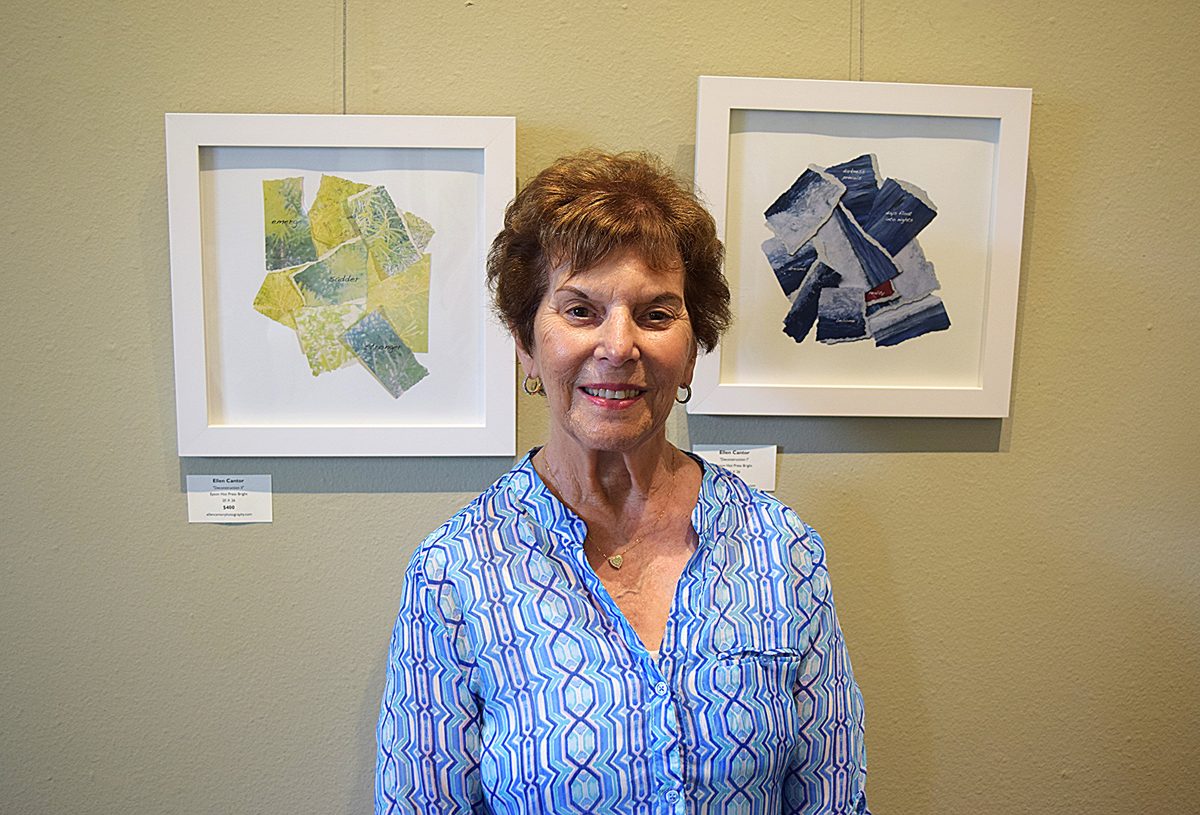While grieving the loss of her husband, Ellen Cantor composed 100 poems. Many of them appear in her book, “Unfolding Time”
by Bondo Wyszpolski
If we live long enough, we’ll have to say our final goodbyes to close friends and relatives, and these losses may leave a dark void in our psyche or in our souls that never heals. It can be life-shattering. As Roberto Arlt writes in his novel, “The Seven Madmen,” “…within the block of his chest, an immense sadness tore his heartbeats to shreds.”
In sorrow, we are all brothers and sisters, races and religions no longer matter, but grieving for a loved one is personal and each of us must tread our own path forward — out of the darkness and into the light, if possible. Even so, seeking and finding solace in knowing what others have gone through may give us hope and courage. And so we come to Ellen Davidson Cantor, a noted photographer who resides in Palos Verdes, who embarked on her own bereavement journey by way of writing poetry. Afterwards, selections were published as “Unfolding Time: Poems for the Grieving.” This is how it came together, and how it not only helped her but has helped others.
Poetry classes
“My husband of 57 years, Norman F. Cantor, M.D., passed away in 2022,” Ellen says. “He was ill with metastatic bladder cancer.
“When Norman was sick it was very difficult because it was during the pandemic. We couldn’t go anywhere, only to UCLA in Torrance for chemo, and home. That was it. He didn’t want to go out, he didn’t feel well.
“After he passed away in May, that summer I saw an email from Angels Gate about a poetry class given by Nancy Lynée Woo. I didn’t know her, but I was looking for something to do. I’d been a photographer for 20 years, I’d been exhibited in galleries all over the world, but through the pandemic and Norman’s illness I was just unable to focus on photographing, so I took this online course on Zoom.
“Although I’ve been a creative person all my life, I had never done writing, maybe a haiku here and there. But I guess it just was a way for me to express my feelings and emotions after Norman passed away. So I took this class through the summer.”
Ellen would also go on to attend online classes with Victoria Waddle of Inlandia Institute. Waddle helped with editing many of the poems, as did Woo at Angels Gate.
Concurrent with her initial forays into writing verse, Ellen connected with Mark Buchanan, a grief counselor from UCLA Simms Mann Center for Integrative Oncology.
“My grief counselor was very interested in my poetry,” she says, “so I had encouragement for over a year. Every time I wrote a poem he encouraged me. I revised it and I got a lot of satisfaction through that process. And during that year we both watched a webinar by a psychologist, William J. Worden, about the four tasks of mourning.”
Eventually, Ellen continues, “I looked at the relationship of my poetry and the trajectory of the poems from beginning, middle, late-middle to end, and actually [saw how they] fit into his four tasks of mourning, which is how I designed the book.”
In the completed volume, several poems fall under each task, the latter defined in this way: Task 1: To Accept the Reality of the Loss; Task 2: To Process the Pain of Grief; Task 3: To Adjust to a World Without the Deceased; and Task 4: To Find an Enduring Connection with the Deceased in the Midst of Embarking on a New Life.
They cohere as one
However, let’s take a step back, to before the poems were harvested into a cohesive and linear whole. Buchanan, having read many of the poems, asked Ellen if perhaps they could be assembled into book form and given to other grief counselors at Simms Mann.
“I said sure,” Ellen replied, “if you think they could use it. So, I thought, well, I could go to Staples and print copies and hand them some sheets, but that’s just not me. I wanted to make a book out of it. I wanted it to be something for other people that are grieving, that hopefully my poems could bring peace and help to people who are in the position I was in.”
Over the course of more than a year, Ellen wrote about 100 poems. With Buchanan’s help, they narrowed them down to the 31 that are in the finished book. “The sequence,” Ellen says, “is pretty much in order of when I wrote them.”
In fact, a few titles can convey an idea of the whole, the progression from loss and anger to acceptance and emotional strength: “Why Did You Leave Me?,” “Without You,” “The House is Silent,” “There is No Halting Time,” “It Will Never Be The Same,” “Finding the Path Forward,” “Emergence,” “The Act of Separation,” and “Forever and Ever.”
Each poem is a flower placed on the altar of memory, and many of the poems, like prayers in lyric form, address her husband directly. For example, “a silent tranquility/ drifting through the rooms/ floating on nothingness/ making me aware of your absence” or “aware of your being/ recovering our legacy/ holding your soul/ feeling your essence.”
The poems in “Unfolding Time” don’t stray very far from this sentiment, and one could say that they are all variations on a narrow theme. “Without You,” from Task 1, and “Emergence” from Task 4, are the same poem, but what separates them, and gives the latter more optimism, is the title.
To be clear, these writings are far removed from, let’s say, Allen Ginsberg or Lawrence Ferlinghetti. Ellen’s poems are quieter, subdued, whispered not declaimed from a podium, and they rest close upon the wounded heart.
Visually expressive
I mentioned above that Ellen Cantor is a noted photographer, although she was photographically bankrupt during her husband’s illness. However, early last year she returned to it via an online photography class with Joanne Dugan, a former Guggenheim recipient.
“I took photographs,” Ellen says, “and I didn’t like them. One day I just tore them all up to clean up my desk. I threw them on the table, and I went, Oh! I really like that! That explains how I feel, that my life has been torn apart and I don’t know how to put it back together.”
This is what we call a happy accident.
“Much to my surprise I created a new series, ‘Deconstruction.’” Ellen then pauses and reaches for the copy of her book that lies between us before reading an applicable passage from the Introduction: “This body of work explores what happens when a part of us breaks apart and must be reassembled without an instruction manual. Each piece is a guide into life’s complexities and explores the idea that no matter how broken something or someone has become, the parts can be mended. The whole becomes an exploration into the future, while holding onto memories of the past.”
The book contains five of the deconstructed, reconstructed images. Because this little volume is printed on thick, glossy stock, the images stand out. They’re rather different from what one might have expected a photographer to resort to, in order to convey her grief (an empty closet, a table set for one person, and so on).
For the most part, the poems were composed during the earlier part of the day.
“I was exercising at that time,” Ellen says (knee surgery has put a temporary hold on that), “and after exercising, coming home, having breakfast, I would go to the computer and I would write. But I would think about the poems at night in bed or in the morning, and before I could write one I had to have a thought about it. That year when I was writing them, they seem to have come pretty quickly. I can’t explain it. I was never a poet, I was never a writer; I was a photographer, I was an interior designer, I had a lot of careers…”
She then references the fourth task, quoted above. “So that’s where I stand,” Ellen says, “‘Embarking on a New Life.’ It’s different; and it’s not always good fun, but you have to move forward.” And she adds that if her grief counselor hadn’t encouraged her, “I don’t know that they would have become a book.”
But as soon as it did, she gave copies to numerous clinicians at Simms Mann. “I got feedback that they also want to use it with their patients. In fact, one patient contacted me; she wanted a book of her own.”
Initially, Ellen ordered 100 copies. After they were dispersed, people contacted her hoping to buy one. She agreed to print and sell additional copies, but also decided “to give a portion of every book back to Simms Mann. I don’t want to make this a business.” So she only keeps the cost of printing, but then donates the remainder.
Lifted through the air
There’s one poem in the book that didn’t neatly fit under any of the four task headings. It’s called “The Wind Phone” and Ellen inserted it at the front as a sort of prelude. The object of the title goes back to Itaru Sasaki, who placed an old telephone in his backyard so that he could symbolically speak to his departed wife. Ellen’s poem is different from the 30 that follow it. She writes, “Untethered to telephone poles or fiber optics,/ The Wind Phone allows me to speak to you once again.” The poem also has more “body” than the other poems. It ends like this: “I relay messages about everyday occurrences:/ watching Jeopardy the way we did nightly, checking out/ the news with David Muir, writing poetry to guide me/ through my grief journey, selling one of my multiple image/ photographs, daily trips to radiation for my skin cancer,/ struggling with a purple cast on my broken right wrist that/ leaves me helpless, loneliness when I go to bed.” And then, for the sixth time, the concluding refrain: “I call you on The Wind Phone.”
Ellen is asked if talking about her loss is difficult for her.
“No, I’m really good with it,” she replies, “because I feel like I went through and completed the grief process, and I have a sense of completion. I don’t feel like I have any hanging ends. When my grief counselor wanted to share these [poems] with other grief counselors at Simms Mann I had a feeling that I had finished. Yes, I miss my husband and I miss having him here, but I did the work of grieving and this was the result of it.
“I went through the whole year of grief counseling with support, and that’s what helped me. So I feel that I did the work, and I would encourage other people to seek out some kind of grief counseling, whether it’s an individual group or through your church or temple. Don’t lock it away in a box in the back of your head because it will come back. And that’s why I wanted to give the book away last year, because I felt that this was my gift to those people that have a need or needed help.”
For more about Ellen Cantor Davidson visit ellencantorphotography.com. PEN

Memory Fades
everywhere there is breakage
life cradles us, cracks, departs without warning
summer flowers disappear into the murky earth
abandoned possessions become rubble
torn and shredded paper deletes our daily tasks
shattered computers capture our information
cracked phones leave us disconnected
illness overtakes the body with tiny spots
growing into massive cancers
the earth swallows up our loved ones
allowing only visitations in our minds
everywhere there is breakage
like cradles us, cracks, departs without warning
memory fades each time the sun goes down








